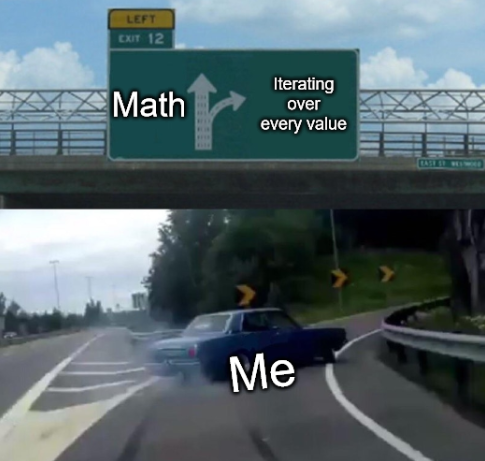The naïve and unoptimized version ran in under 4 seconds for me, that's nowhere near "Time to knuckle down and actually optimize this" territory.
I was so confused just now thinking this was about day 5. Like "What the f do you consider naïve that takes less than four seconds??"
O(fuck)
this is funny
Too scarred from puzzle 5 to do the naïve approach anymore.
Dude, 5 was so weird, I didn't even recognize a hard or easy approach.
Math is something computers know how to do. I know how to do For Each loops.
Just use dictionaries in Python. Never worry about search performance any more.
I mean, that literally failed just yesterday.
Also I'm not sure where in today's problem you would even use a dictionary
Hey, I haven't been doing Advent this year. What was day 5's problem and why did dicts fail?
There was a series of number ranges that mapped onto other ranges. The simple approach was filling dictionaries, which worked well for the example data. In the actual data, there ranges were much much larger (in the 100,000,000's), which made the dictionaries prohibitively large.
If each number was 8 bytes wide, it would require, if I didn't mess up my math, 18 GB to fully represent all seeds/numbers as an array.
progamming ↑↱ excel
There is a trap in part 2, by the way, that can trip people who try to use maths:
Spoiler
The values are so large that if one uses single precision (32 bit) floating point values, the result will not be correct. Double precision floats yield the correct result.
This means, that doing integer calculations isn't as bad as it sounds at first.
Advent Of Code
An unofficial home for the advent of code community on programming.dev!
Advent of Code is an annual Advent calendar of small programming puzzles for a variety of skill sets and skill levels that can be solved in any programming language you like.
AoC 2023
Solution Threads
| M | T | W | T | F | S | S |
|---|---|---|---|---|---|---|
| 1 | 2 | 3 | ||||
| 4 | 5 | 6 | 7 | 8 | 9 | 10 |
| 11 | 12 | 13 | 14 | 15 | 16 | 17 |
| 18 | 19 | 20 | 21 | 22 | 23 | 24 |
| 25 |
Rules/Guidelines
- Follow the programming.dev instance rules
- Keep all content related to advent of code in some way
- If what youre posting relates to a day, put in brackets the year and then day number in front of the post title (e.g. [2023 Day 10])
- When an event is running, keep solutions in the solution megathread to avoid the community getting spammed with posts
Relevant Communities
Relevant Links
Credits
Icon base by Lorc under CC BY 3.0 with modifications to add a gradient
console.log('Hello World')
